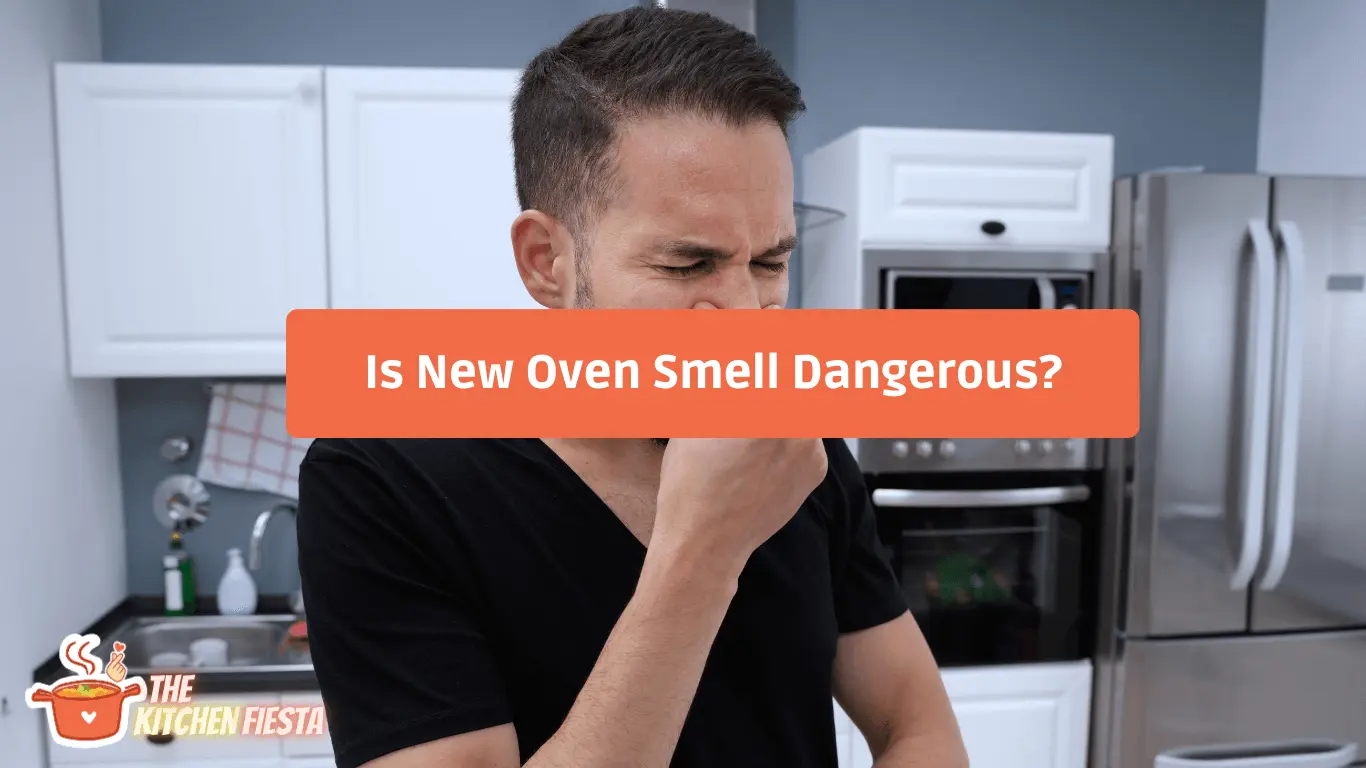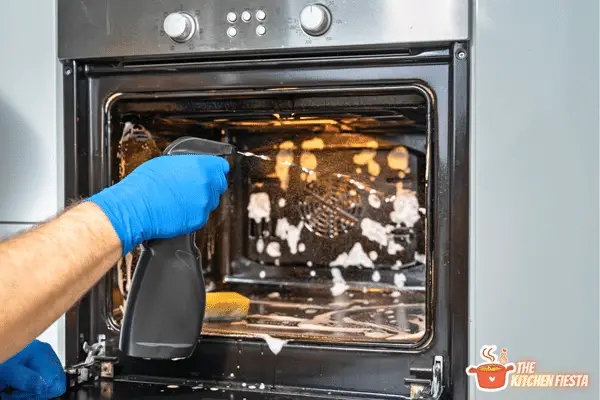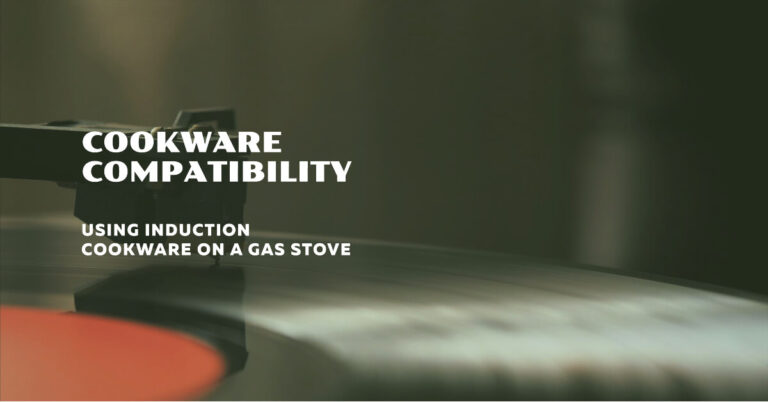Is New Oven Smell Dangerous? Here’s What You Need to Know

So you finally got that brand new oven you’ve been dreaming of. You eagerly unpack it, slide it into place, and plug it in. As you preheat it for the very first time, an odd smell wafts through the kitchen. It’s not exactly like burning plastic, but it has a definite chemical undertone. Should you be worried? Is that new oven smell dangerous?
The short answer is: probably not, as long as the smell isn’t overpowering or persistent. But it’s understandable to be concerned when your new appliance emits a foul odor. This post will examine common causes of new oven smell, when you should worry, and how to safely get rid of it.
What’s That Smell? Reasons Your New Oven Might Stink
When you first turn the oven on, you may notice an unpleasant smell similar to burning plastic or chemicals. Several factors can cause this new oven smell:
- Protective coatings burning off. New ovens are coated with oils and other substances to prevent damage during manufacturing and shipping. Heat from the oven causes these coatings to emit fumes.
- Insulation, adhesives and lubes. As these oven components heat up, they can give off that new oven smell.
- Leftover manufacturing materials. Plastic ties, cardboard protectors, etc can burn and cause odors if not fully removed.
- Burning off residues or dust. The first few times an oven is used, it may burn away residual grime from the production process.
The main culprit is usually the protective coating of oil or plastic used inside the oven cavity. As this coating gets hot, it emits fumes with that trademark new appliance smell. It’s unpleasant, but is new oven smell dangerous?
Is That Smell Harmful?
The smell coming from a new oven is generally not hazardous. At low concentrations like you’d experience during normal use, the fumes are merely annoying – not toxic.
However, there are a few reasons the smell can still be cause for concern:
- Fumes from burning coatings and materials indicate chemicals are present. Even if not highly toxic, it’s best to minimize exposure.
- No one knows potential long-term effects of low-level exposure. There may be health risks from repeatedly inhaling small amounts.
- Very strong smells likely mean higher chemical concentration. Prolonged exposure to high levels of fumes could potentially cause symptoms.
So while not outright dangerous in most cases, avoiding the new oven smell is probably wise. Let’s look at when you should worry.
When to Worry About That New Oven Smell?
Here are some scenarios where that new oven odor warrants action:
- The smell is very strong or overpowering. This suggests higher chemical levels, so exposure should be limited.
- Using the oven causes burning eyes, headaches, coughing or nausea. This indicates the fumes are irritating you.
- The unpleasant smell persists for more than 2-3 uses. It should fade quickly as coatings burn off. Ongoing smell likely means an issue.
- There is a distinct smell of gas along with the other odor. This points to a dangerous gas leak, so call for oven repair immediately.
- You have respiratory issues like asthma that could be aggravated. It’s best to limit exposure to any strong chemical smells.
- Pets are showing signs of irritation like watery eyes. Their smaller size makes them more vulnerable.
If the above describe your situation, you likely want to get rid of that new oven smell sooner rather than later. Next we’ll go over effective tips.
How to Get Rid of New Oven Smell Quickly and Safely?
If your new oven emits a funky odor, try these methods to eliminate it:
Run a “Burn-In” Cycle
Many modern ovens have a special burn-in cycle or mode designed specifically to burn off manufacturing residues. Consult your manual and run this cycle a few times until odors dissipate.
Heat Empty Oven at High Temp
Alternatively, run the oven empty at a high temp like 500F for an hour or so. Keep the kitchen well-ventilated. The goal is to encourage the protective coating to burn off faster.
Clean with Baking Soda and Water
Wipe the oven interior thoroughly with a baking soda and water solution using a soft cloth. This can neutralize odors without harsh chemicals.
Steam Clean
For stubborn smells, run a steam clean cycle. The moisture helps loosen contaminants so they can be wiped away.
Don’t Cook Food Until Smells Stop
It’s best not to cook actual food in the oven until chemical smells cease, as odors can transfer. Stick with burn-in cycles and cleaning before baking.
Ventilate the Kitchen
No matter what oven cleaning method you use, be sure to turn on exhaust fans and open windows. Proper ventilation reduces exposure to fumes.
With a combination of these tips, the new oven smell should fade after a few thorough oven cycles or cleaning sessions. If not, keep reading.
When to Stop Trying to Fix It Yourself?
If you’ve run multiple empty oven cycles at high heat and cleaned thoroughly but that stubborn smell persists, it may be time to take more serious action. Here are some signs it’s time to stop trying DIY fixes:
- The unpleasant odor remains strong after 2-3 thorough cleanings and burn-in cycles.
- You notice the smell tends to be worse when oven is heating or cooking, then improves when cooling down. This points to a recurring issue.
- Burning plastic or smoke smells linger, rather than merely a general chemical odor. This could mean wiring or component issues.
- The oven isn’t heating properly, or cooks unevenly. Performance issues suggest it needs servicing.
In these cases, it’s best to discontinue home remedies and contact the manufacturer or authorized repair company. Be prepared to provide details like when/where you bought it and oven model. Here are some other options:
- Request replacement – For persistent bad smells present since unboxing, you may qualify for an exchange or refund.
- Schedule servicing – Technicians can diagnose and replace problematic parts. This may be needed for electrical smells.
- Request on-site cleaning – Many brands offer professional deep cleaning services. This thorough scrub-down may eliminate smells you can’t.
- Check for recalls – If there is an active recall due to odor issues, stop using the oven and get it inspected immediately.
With the right repairs, your oven should once again be smelling sweet in no time. But for future appliance purchases, there are also some prevention tips.
Preventing Odors When Installing a New Oven

To avoid the whole stinky new oven situation when adding an appliance:
- Unpack outside if possible and air out packaging for 24 hours before installing. This allows smells from manufacturing to dissipate.
- Read all labels and remove plastic components, ties, and protective coverings. Missed plastics often cause odors.
- Run one or more burn-in cycles before cooking with a new oven. This helps loosen residues so smell decreases faster.
- Ventilate the kitchen well when using a new oven, especially for the first few times. Keep windows open and fans running.
- Try to keep pets or young children out of the kitchen when first using a new oven until any chemical smells have stopped. Their smaller size makes them more vulnerable to effects of fumes.
Taking these preventative steps will help minimize that unpleasant new oven smell experience.
The Takeaway – Enjoy Your New Oven Safely
Having to deal with a stinky new oven can put a damper on your excitement for your shiny new appliance. But in most cases, the smell is merely a nuisance and not a reason to panic or return the oven.
With some thorough cleanings and burn-in sessions, the odor should fade after those first few uses. And you can get back to happily preheating, baking, roasting and broiling to your heart’s content.
Just be sure to ventilate your kitchen well whenever using your oven, make note if any warning signs pop up, and don’t hesitate to request repairs or replacement if an odor persists despite your best efforts.
With a little patience for that new oven smell to dissipate, plus proper care and maintenance, your new oven will be providing delicious results and wonderful memories for years to come. So turn up the heat and let’s start baking!




